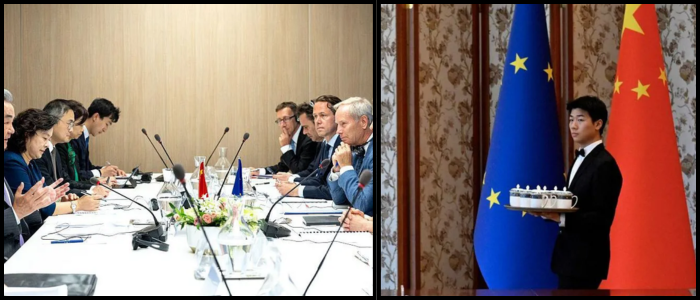The meeting, initially expected to take place in Brussels, was postponed after Chinese President Xi Jinping reportedly declined the invitation. However, China later confirmed that President Xi would meet with European Commission President Ursula von der Leyen and European Council President Antonio Costa in Beijing.
Optimism had surrounded the partnership earlier this year, particularly with expectations that a potential return of Donald Trump to the US presidency might bring the EU and China closer. But relations between the two powers have grown more complex and strained in recent months.
Trade Tensions and Economic Challenges
Trade issues remain a central point of disagreement. After the EU imposed tariffs on Chinese-made electric vehicles last year, Beijing retaliated with duties on European liquor. Earlier this month, China also placed limits on government purchases of EU-made medical devices, responding to similar restrictions by the EU in June.
A bigger concern lies in China's growing export controls on rare earths and critical minerals. European Commission President von der Leyen has accused China of using its near-monopoly in this sector as a tool to undercut international competitors in vital industries.
Europe's frustration is also tied to its rising trade deficit with China, which reached €305.8 billion ($360 billion; £265 billion) last year — double the figure from nine years ago. This growing imbalance is viewed as a threat to European industries, especially with the influx of cheaper, subsidised Chinese products.
Chinese ambassador to the EU, Cai Run, criticised the EU's approach in a recent interview, saying the EU's classification of China as a "partner for co-operation, economic competitor, and systemic rival" sends mixed signals. "The EU's threefold positioning of China is like a traffic light going green, amber and red lights all at once," he said, arguing it only leads to confusion and conflict.
Ukraine War and Strategic Disagreements
The Russia-Ukraine conflict is another key source of disagreement. Just last week, the EU sanctioned two Chinese banks for their alleged role in supporting Russia, which irritated Beijing just ahead of the summit. China responded by issuing "solemn representations" to the EU's trade chief.
There are also circulating claims that Chinese foreign minister Wang Yi told EU foreign policy chief Kaja Kallas that Beijing does not want to see Russia lose the war in Ukraine — a statement that contradicts China's declared position of neutrality. Though officially denied, this has further deepened mistrust.
Earlier this year, Kaja Kallas had labelled China the "key enabler of Russia's war," suggesting that if China truly intended to stop its support, it could have a significant impact.
Von der Leyen, upon arriving in Beijing, said on social media that the summit is a chance to "advance and rebalance" EU-China relations, expressing belief in the possibility of a mutually beneficial partnership for the future. But despite these hopeful statements, expectations are low in Brussels, with many EU officials preparing for difficult and frank conversations.
President Xi's decision to avoid Brussels earlier and his attendance at Russia's military parade in May have done little to ease European concerns. Engin Eroglu, head of the European Parliament's China delegation, described the current situation as one of "strategic mistrust" and said the atmosphere is strained.
While both sides have framed the summit as an opportunity to build on past achievements, it is clear that deep disagreements — especially over trade and foreign policy — continue to weigh heavily on EU-China ties.
World

EU-China Summit Opens Amid Growing Tensions

A major summit between the European Union (EU) and China opened in Beijing on Thursday, but hopes for breakthroughs remain low as tensions over trade, politics, and the war in Ukraine continue to strain the relationship.















